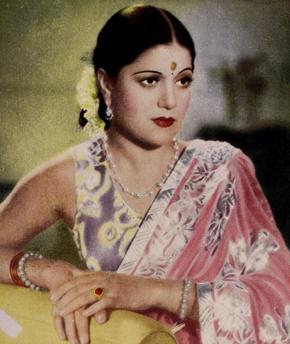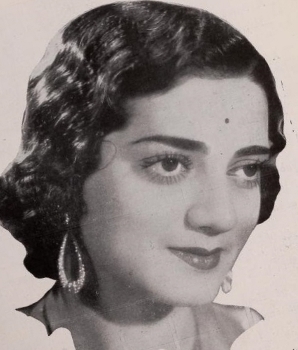Related Research Articles
Gul Hamid (1905-1936) was an Indian actor. He started his acting career in silent films and later played leading roles in talkies. He had many honors to his credit. He acted in Heer Ranjha, the first film produced in Punjabi and in Seeta, a talkie that won an honorary diploma in the 1934 Venice Film Festival and that was also the first Indian film shown at an International film festival. Hamid also wrote the script, acted in, and directed the film Khyber Pass (1936). Hamid died of Hodgkin's Disease in 1936.

Abdur Rashid Kardar (1904–1989) was an Indian film actor, director and producer. He is credited with establishing the film industry in the Bhati Gate locality of Lahore, British India.

Mehtab (1913–1997) was an Indian actress of Hindi/Urdu films who worked from 1928 to 1969. She was born in Sachin, Gujarat, to a Muslim family and named Najma. Her father, Nawab Sidi Ibrahim Mohammad Yakut Khan III, was the Nawab of Sachin, near Surat in the state of Gujarat. Starting her career in the late 1920s with small roles in films like Second Wife (1928), Indira B. A. (1929) and Jayant (1929), she went on to do character roles before acting in the lead opposite Ashraf Khan in Veer Kunal (1932). After almost a decade of doing mainly action-oriented roles, she came into prominence with the Kidar Sharma-directed Chitralekha (1941).
Rani Saheba also called Bazarbattu is a 1930 Indian silent film. It is cited as the first children's film made in India. The film was co-directed by V. Shantaram and Keshavrao Dhaiber. The cinematographers were S. Fattelal and Vishnupant Govind Damle and the cast included Keshavrao Dhaiber, Baburao Pendharkar, V. Shantaram and Anant Apte.
Husn Ka Daku is a 1929 action adventure silent film directed by A. R. Kardar. The film, also called Mysterious Eagle was made by Kardar's Playart Phototone. Kardar acted in this, his first production from Playart Phototone. Playart Phototone was a progression from United Player's Corporation, which he had set up in 1928. Husn Ka Daku was Kardar's debut directorial venture. It set the foundations for the Lahore film industry in the Bhati Gate area of Lahore. The director of photography was D. D. Dabke.
Sarfarosh also called Brave Hearts was a 1930 Indian silent film directed by A. R. Kardar. Made as action adventure film based on the RKO dramas, it was produced by Kardar's production company, "Playart Phototone". According to Hameeduddin Mahmood, the films had double titles up until the mid-1930s; the Hindi/Urdu name for the home market (India), and the English name for the overseas market. Kardar gave up acting after having starred in Husn Ka Daku (1929) and cast Gul Hamid in the main role. He also gave Rafiqe Ghaznavi a break as an actor in the film. Ghaznavi went on to become a famous music director.
Safdar Jung is a 1930 action costume silent film directed by A. R. Kardar. The film was the third to be produced by Kardar's United Players Pictures, following Husn Ka Daku (1929) and Sarfarosh (1930).
Baghi Sipahi is a 1936 Hindi/Urdu film directed by A. R. Kardar. It was an adaptation of Cardinal Richelieu (1935) directed by Rowland V. Lee, a Twentieth Century Pictures production, which was a big success at the box-office. Baghi Sipahi, a costume action drama, was produced by the East India Film Company.

Aurat Ka Pyar is a 1933 Indian film directed by A. R. Kardar. The film was produced by the East India Film Company, in Calcutta. Kardar had moved from Lahore to Calcutta where he directed several films for the company from 1933–36, including Aurat Ka Pyar. The music composer was Mushtaq Ahmed and lyrics were by Agha Hashar Kashmiri, who also scripted the film. It starred Gul Hamid, Mukhtar Begum, Mazhar Khan, Anwari Bai, Bacha, Abdul Sattar and Athar.
Chandragupta is a 1934 Hindi/Urdu historical film directed by A. R. Kardar. Produced by East India Film Company, the music direction was by K. C. Dey. Kardar had shifted to Calcutta where he joined the East India Film Company, and directed "hits" like Chandragupta. The film starred Nazir as Chandragupta. The cast included Gul Hamid, Sabita Devi, Mazhar Khan, Dhiraj Bhattacharya, Vasantrao Pehalwan.

Thokar also called The Kick is 1939 Hindi/Urdu film directed by A. R. Kardar. Produced by Chandulal Shah for his production banner Ranjit Movietone, it had music by Gyan Dutt. The story writer was M. Sadiq, with cinematography by Gordhanbhi Patel. The cast included Kumar, Ishwarlal, Madhuri, Yakub, Noor Mohammed Charlie, Ram Marathe, Waheedan Bai and Dixit.
Sultana is a 1934 Hindi/Urdu film directed by A. R. Kardar. The film was produced under the East India Film Company banner. The music director was Mushtaq Ahmed, who also played a small role in the film. The lyrics were written by Munshi Aziz. The cast included Gul Hamid, Zarina, Mazhar Khan, Nazir, Indubala, Nawab and Athar.
Farebi Shahzada also called The Shepherd, is a 1931 Indian cinema's action silent film directed by A. R. Kardar. The film was also known as Gudaria Sultan or The Shepherd King and was the fourth of seven films Kardar produced under Kardar's United Players Corporation, Lahore.
Khooni Katar also called Golden Dagger is a 1931 Indian cinema's action adventure silent film directed by A. R. Kardar. The film was also called Sunheri Khanjar and the fifth film to be produced by Kardar for his United Pictures Corporation. The film is famous for the debut of the actor-producer-director Nazir.

Homi Master (?–1949) was an actor-director of early Indian cinema. His work extended from the silent era to the talkie era and up to his death. He produced his best films for Kohinoor Film Company and he has been referred to as "silent cinema's most successful film-maker".

Sardar Akhtar (1915–1986) was an Indian actress who worked in Hindi and Urdu films. She started her acting career on the Urdu stage. Her early films were with Saroj Movietone, where she did a majority of stunt (action) roles. She came into prominence as the washer-woman in the role of Rami Dhoban in Sohrab Modi's Pukar (1939). As a woman seeking justice for the death of her husband, it was a breakthrough role for her. A popular song she sang in the film was "Kaheko Mohe Chhede". Her career defining role was as a "peasant woman" deserted by her husband, in Mehboob Khan's Aurat (1940), a role later made famous by Nargis in Mehboob's remake Mother India.

Sabita Devi (1914–1965) was a Hindi film actress in Indian cinema. She is stated to be one of the "prominent" leading ladies of the "pioneering era" of Indian cinema along with Mehtab, Bibbo, Durga Khote, Gohar, Devika Rani and Seeta Devi. A Jewish by birth, she changed her name to find acceptability in Hindi cinema like the other Anglo-Indian and Jewish actresses of her time, Sulochana, Seeta Devi, Madhuri, and Manorama. After initially working with British Dominion Films Ltd., Calcutta, she shifted to Bombay and performed mainly in films produced by Sagar Movietone with her co-star in most films being Motilal. Some of the popular films with Motilal were Dr. Madhurika (1935) and Kulvadhu (1937) directed by Sarvottam Badami. Their first film together was Shaher Ka Jadoo (1934), which was also Motilal's debut film, and then Lagna Bandhan (1936) both directed by Kaliprasad Ghosh. She acted in Silver King (1935) with Motilal. It was an action film directed by C. M. Luhar, which became a "huge success".
M. Zahoor, also written as M. Zahur or Zahoor Ahmed, was an actor known for playing villains in Hindi films in India during 1930s and 40s. He was the maternal uncle of the Indian actress-singer, Suraiya, and was instrumental in her getting entry into Hindi films in Bombay. In 1941, he took her to the sets of the movie Taj Mahal, where she was spotted by the director of the film, Nanubhai Vakil, who selected her to play the role of the young Mumtaz Mahal. Zahoor also wrote the story of the film 1857 (1946), starring Suraiya and Surendra. He migrated to Pakistan along with his mother later after India's independence.

Mazhar Khan was an actor, producer, and director in Indian Cinema. He started his career as a police officer, which he left to study law for a short period. After abandoning his studies, he came to Bombay and started his career in cinema with the silent film Fatal Garland (1928) opposite the top actress of the time, Ermeline. He became a popular actor, gaining success in several silent films. During his stint in silent films he worked with well-established directors such as Bhagwati Prasad Mishra, Ezra Mir, Moti P. Bhagnani, R. S. Chowdhary, and M. D. Bhavnani. Magazines in the 1940s compared Khan to Hollywood actors such as Paul Muni, Bela Lugosi and Boris Karloff.
Playart Phototone was a film studio established in 1929 by Abdur Rashid Kardar.
References
- ↑ Ashish Rajadhyaksha; Paul Willemen; Professor of Critical Studies Paul Willemen (2014). Encyclopedia of Indian Cinema. Routledge. p. 122. ISBN 978-1-135-94318-9.
- ↑ Gautam Kaul (1998). Cinema and the Indian Freedom Struggle: Covering the Subcontinent. Sterling Publishers. ISBN 978-81-207-2116-6.
- ↑ Patel, Baburao (September 1940). "Kardar-India's Ever-Smiling Director Life story of the man who made Pagal". Filmindia. 6 (9): 79. Retrieved 4 April 2015.
- 1 2 "A. R. Kardar". filmtvguildindia.org. Film And Television Guild of India. Archived from the original on 30 March 2015. Retrieved 4 April 2015.
- ↑ "History of film production from Lahore". mpaop.org. Motion Pictures Archive of Pakistan. Retrieved 4 April 2015.